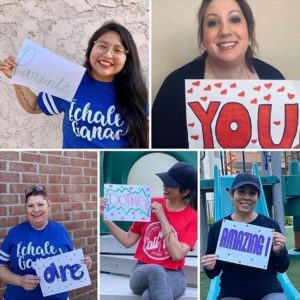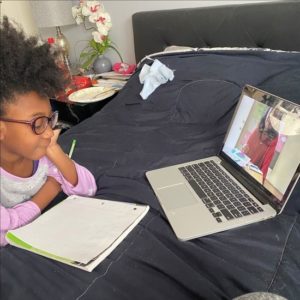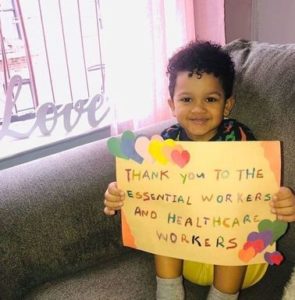Richard Barth's Weekly Thoughts: COVID-19 and Equity
ByRichard Barth, KIPP Foundation CEO
KIPP SoCal Public Schools staff
It is humbling to see all the ways in which big KIPPsters are meeting this moment. As we get ready to begin the month of May, I wanted to give us all a chance to hear directly from leaders across our network as they problem-solve and reflect on the work ahead. As our Chief Equity Officer Benny Vasquez has shared: “COVID-19 has exacerbated the equity issues that our students, families, and educators of color are already dealing with. Our approach must account for that.”
As you hear from your colleagues, you are bearing witness to the ways in which we are coming to grips with the disproportionate impact of this crisis on Black and Latinx students and families over time. Black and Latinx Americans are dying at twice the rate of white Americans. Families with the least financial wealth are the first to lose their income and access to food due to COVID-19. People with the least access to healthcare are getting sick at the highest rates. Children with the fewest resources are facing the greatest educational challenges, such as access to technology for distance learning while schools are closed.
As you listen to your KIPP colleagues, two things are clear: First, big KIPPsters are showing up for students and families in new ways to meet this challenge. Second, we are battling the effects of structural racism that are making this far more difficult for our students.
Philadelphia

KIPP Philadelphia Public Schools student learning at home
“Parents are really worried about learning loss,” says KIPP Philadelphia Public Schools executive director Jessica Cunningham-Akoto. “We’ve been focused on giving thoughtful, qualitative feedback on the work that our students are producing while we’re closed, and through that deepening our connections with them.” Social workers are pushing out content to help support parents whose children are struggling with emotional regulation or who need special-education services at home.
In terms of the bigger picture, Jessica shared that, “One of the things that makes this harder for the families we serve is that there is a dearth of resources that are helpful and geared directly towards them. If you look at social media and articles in the paper, those are very much designed to speak to middle-class and upper-middle-class families. I have yet to really see a resource that helps parents understand, ‘If you are living in a one-bedroom apartment with this many people, here’s how you could be thinking about using space for this time.’ We need more of that.”
Southern California
Angella Martinez, the Chief Academic Officer of our KIPP schools in Southern California, shared that, “When you think about hierarchy of needs, you have to have food, you have to have shelter, and then you have to have psychological safety.” To make sure students and families get fed, our schools in Southern California partnered with Revolution Foods to provide a healthy breakfast, lunch, snack, and supper every school day at all of their campuses—more than 305,000 meals to date. During this time, they prepare meals not only for KIPPsters, but for any community members who come to the school.
The KIPP SoCal team has also focused on digital access, distributing 4,000 computers and wi-fi hotspots, as well as 1,000 iPhones that could be used as hotspots, to families who had limited internet access at home. They raised funds to cover the upfront costs of providing this technology and negotiated new contracts with providers that waive the usual year-long costs for internet service.
Thinking longer-term, Angella says, “We talk about trauma-informed schools, and this is adding a new layer of trauma. You’ve taken away schools, you’re taking away access to food, access to jobs, access to resources, all these things being stripped away…because of the historical systemic barriers that have been in place…Are we actually going to redo structures in real time to support our communities?”
New York City

KIPP NYC Public Schools student
At KIPP Freedom Middle School in NYC, school leader Lariely Sanchez has been working to provide consistency and reassurance for students during these tenuous times, including setting up a nightly read-aloud session on Instagram.
As Lariely wrote in an opinion piece for Education Week, “The important thing is that we transform the waiting place into action. We need to create, we need to inspire, we need to do. For our students, that means TikTok videos on the importance of washing your hands, and dance challenges between advisory groups to maintain a sense of community and joy. For us as educators, it means continuing to advocate for the needs of our families. We need more food, we need more cleaning supplies, we need more laptops and iPads, we need legislation that protects our families from losing their jobs or their homes. We need a rent freeze. We need essential workers to receive essential pay. We are doing everything we can, but we need help ensuring that the basic needs of our students are met.”
Our Federal Work
At the national level, KIPP is leading a coalition working with Congress to ask for an expansion of the federal e-rate program so that all families have access to internet, and to expand Title I funding for the next three years to fill gaps in funding that schools are currently experiencing. You can read more about this from our policy director, Lorén Cox, in an op-ed for The Hill from earlier this month.
I want to close with a thought from Manny Aceves, Chief External Impact Officer at KIPP SoCal: “There has been no other situation that has shown the glaring inequities that our families are facing right now. It’s getting the attention of some, but it’s not getting the attention of enough. If we’re able to reset and rethink, that’s where I think we’re going to see real positive change for those who have been most vulnerable.”
Thank you for all you do every day. Let’s make this day a great one for our KIPPsters.
